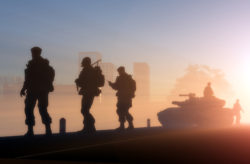Top Class Actions’s website and social media posts use affiliate links. If you make a purchase using such links, we may receive a commission, but it will not result in any additional charges to you. Please review our Affiliate Link Disclosure for more information.

Military members and their loved ones can seek compensation for any EFP roadside bomb injury they suffered while in Afghanistan or Iraq, with the investigation also open to victims who sustained IED attack injuries as well.
The Department of Defense recently learned that Iran supplied certain IEDs and EFPs to extremist groups in Iraq and Afghanistan, which allegedly resulted in numerous IED and EFP roadside bomb injuries. United States military members or family members who lost their loved ones from an IED or EFP roadside bomb injury, may now be able to file legal action against certain banks that helped support these acts of terrorism.
According to a 2006 report from the British newspaper The Telegraph, Iran had manufactured and supplied large amounts of IEDs and EFPs to send to Iraq. These weapons were allegedly sent to Iraq to help Shiite extremists, who had been terrorizing the citizens of Iraq and Afghanistan and United States military personnel.
This allegation was confirmed in 2011 by Chairman of Joint Chief of Staff at the time Mike Mullen, who stated that top Iranian government officials were not only aware that the IEDs and EFPs were being manufactured in their country, but had also known that the weapons were going to be used to commit acts of terrorism.
Overview of IED and EFP Roadside Bomb Injury Risks
There are several different kinds of weapons United States military personnel have encountered in Iraq and Afghanistan, each of which can cause permanent life altering injuries and death:
- IED (Improvised Explosive Device): An explosive device with a detonation mechanism, often used in roadside bombs and are widely responsible for a significant portion of coalition deaths. Up until 2007, IEDs were used in 63% of coalition deaths in the Iraq War and 66% of deaths in Afghanistan War from 2001 to present.
- EFP (Explosively Former Penetators): Categorized as “the most lethal weapons American forces faced in Iraq” by the New York Times, due to how easily camouflaged they could be and how much damage they could inflict. This made United States military especially vulnerable to EFP roadside bomb injury. EFPs are armor piercing weapons, which can be hidden far from the road and can travel over 100 yards to their targets.
- IRAMs or RAMs (Improvised Rocket Assisted Munitions): Also called rocket propeller bombs, IRAMS are propane tanks containing explosives and are powered by 107mm rockets. These devices are often launched from the back of trucks and can be launched remotely.
While Congress had implemented sanctions on Iran to prevent the country from participating in acts of terrorism or sponsoring terrorist activity, Iranian government officials had gotten around this by seeking out banks interested in significant financial kickbacks.
These anti-terrorism sanctions had severely restricted Iran’s ability to utilize funds to manufacture and supply these weapons; however, these banks had helped Iranian government officials circumvent these policies in exchange for significant financial profits.
Nine banks have admitted to wrongdoing and reached settlements with the United States, including HSBC of UK, BNP Paribas of France, and Germany’s Commerzbank.
If you or a loved one was injured or killed by an IED or EFP while fighting in the Iraq or Afghanistan wars, legal recourse is available. Get help now by filling out the form on this page for a FREE case evaluation.
The attorneys who work with Top Class Actions will contact you if you qualify to let you know if an individual lawsuit or anti-terrorist class action lawsuit is best for you. (In general, anti-terrorist lawsuits are filed individually by each plaintiff and are not class actions.) After you fill out the form, the attorneys who work with Top Class Actions will contact you if you qualify to let you know if an individual lawsuit or class action lawsuit is best for you. Hurry — statutes of limitations may apply.
ATTORNEY ADVERTISING
Top Class Actions is a Proud Member of the American Bar Association
LEGAL INFORMATION IS NOT LEGAL ADVICE
Top Class Actions Legal Statement
©2008 – 2024 Top Class Actions® LLC
Various Trademarks held by their respective owners
This website is not intended for viewing or usage by European Union citizens.
Get Help – It’s Free
Join a Free Iranian IED, EFP Lawsuit Investigation
If you qualify, an attorney will contact you to discuss the details of your potential case at no charge to you.
Please Note: If you want to participate in this investigation, it is imperative that you reply to the law firm if they call or email you. Failing to do so may result in you not getting signed up as a client, if you potentially qualify, or getting you dropped as a client.
Email any problems with this form to questions@topclassactions.com.
Oops! We could not locate your form.












